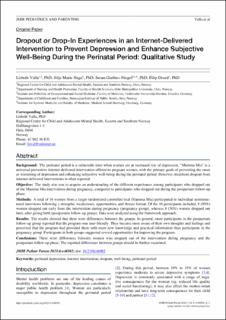| dc.contributor.author | Valla, Lisbeth | |
| dc.contributor.author | Haga, Silje Marie | |
| dc.contributor.author | Garthus-Niegel, Susan | |
| dc.contributor.author | Drozd, Filip | |
| dc.date.accessioned | 2024-02-09T09:32:00Z | |
| dc.date.available | 2024-02-09T09:32:00Z | |
| dc.date.created | 2023-12-28T21:02:32Z | |
| dc.date.issued | 2023 | |
| dc.identifier.citation | JMIR Pediatrics and Parenting. 2023, 6 1-10. | |
| dc.identifier.issn | 2561-6722 | |
| dc.identifier.uri | https://hdl.handle.net/11250/3116546 | |
| dc.description.abstract | Background: The perinatal period is a vulnerable time when women are at increased risk of depression. “Mamma Mia” is a universal preventive internet-delivered intervention offered to pregnant women, with the primary goals of preventing the onset or worsening of depression and enhancing subjective well-being during the perinatal period. However, treatment dropout from internet-delivered interventions is often reported. Objective: The study aim was to acquire an understanding of the different experiences among participants who dropped out of the Mamma Mia intervention during pregnancy, compared to participants who dropped out during the postpartum follow-up phase. Methods: A total of 16 women from a larger randomized controlled trial (Mamma Mia) participated in individual semistructured interviews following a strengths, weaknesses, opportunities, and threats format. Of the 16 participants included, 8 (50%) women dropped out early from the intervention during pregnancy (pregnancy group), whereas 8 (50%) women dropped out later, after giving birth (postpartum follow-up group). Data were analyzed using the framework approach. Results: The results showed that there were differences between the groups. In general, more participants in the postpartum follow-up group reported that the program was user-friendly. They became more aware of their own thoughts and feelings and perceived that the program had provided them with more new knowledge and practical information than participants in the pregnancy group. Participants in both groups suggested several opportunities for improving the program. Conclusions: There were differences between women who dropped out of the intervention during pregnancy and the postpartum follow-up phase. The reported differences between groups should be further examined. | |
| dc.description.abstract | Dropout or Drop-In Experiences in an Internet-Delivered Intervention to Prevent Depression and Enhance Subjective Well-Being During the Perinatal Period: Qualitative Study | |
| dc.language.iso | eng | |
| dc.relation.uri | https://pediatrics.jmir.org/2023/1/e46982 | |
| dc.title | Dropout or Drop-In Experiences in an Internet-Delivered Intervention to Prevent Depression and Enhance Subjective Well-Being During the Perinatal Period: Qualitative Study | |
| dc.title.alternative | Dropout or Drop-In Experiences in an Internet-Delivered Intervention to Prevent Depression and Enhance Subjective Well-Being During the Perinatal Period: Qualitative Study | |
| dc.type | Peer reviewed | |
| dc.type | Journal article | |
| dc.description.version | publishedVersion | |
| dc.source.pagenumber | 1-10 | |
| dc.source.volume | 6 | |
| dc.source.journal | JMIR Pediatrics and Parenting | |
| dc.identifier.doi | 10.2196/46982 | |
| dc.identifier.cristin | 2217927 | |
| dc.relation.project | Norske kvinners sanitetsforening: H3/2013 | |
| cristin.ispublished | true | |
| cristin.fulltext | original | |
| cristin.qualitycode | 1 | |
